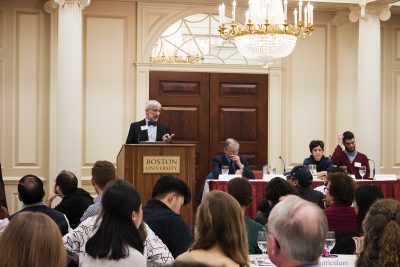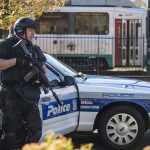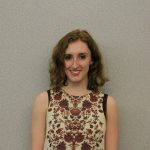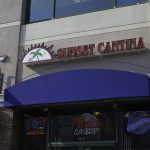
More than 120 Boston University students, faculty and staff gathered Tuesday night in the Metcalf Trustee Center for a public forum on the university’s Climate Action Plan.
Anthony Janetos, the director of the Frederick S. Pardee Center for the Study of the Longer-Range Future, moderated the forum.
Janetos said BU is still in the beginning stages of drafting the CAP, and the CAP Task Force decided to hold the discussion as a way to get student voices and input on the plan.
“The major part of what we’re going to do this evening is ask you to work,” Janetos said during the forum. “Part of the reason that we’re doing this is to get your ideas and expand the discussion of the [Climate Action Plan Task Force] and BU’s Climate Action Plan beyond the initial committee and engage more members of the university community.”
Janetos said the Task Force was created to include not only faculty and staff, but also students — both graduate and undergraduate.
“The diversity of roles and people within the broader university community here is a strength,” Janetos said. “So what I am hoping is that your participation here this evening will also be a strength for us, that we’ll be able to take advantage of your creativity and your thought processes to help us with our job.”
In the last year, the group was tasked with creating a five-point plan based on both science and fiscal suitability, Janetos said.
“This is where the rubber meets the road,” Janetos said. “We’re not just a vehicle for bright ideas. We want to be a vehicle for recommending solutions that actually work within our own institution’s context.”
Several Task Force members then spoke about a few key components of the plan, including energy use, transportation, supply chain, waste and climate preparedness.
Dennis Carlberg, the director of BU Sustainability, spoke about sustainable energy use at the university. He said in order to make a dent in renewable energy, BU needs to look off-campus.
“We’re looking at large scale off-site renewable energy in the form of wind and solar,” Carlberg said. “We’ve got a very robust conversation going on about how we can incorporate all of these pieces into a portfolio which makes sense financially and we can actually pull something off that makes a difference for Boston University.”
Jennifer Luebke, a professor in the School of Medicine, spoke about the supply chain and waste stream, essentially everything bought and used by BU excluding energy.
“This is a very vast field,” Luebke said. “We’re identifying what’s working really well and we’re wanting to make them even better, and we’re also developing new ideas so we can bring Boston University to the top in sustainable development.”
Benjamin Thompson, a post-graduate student in the College of Arts and Sciences, spoke about transportation. He said it is not only commuting and on-campus transportation that factor into BU’s sustainable transportation efforts, but also the travel of faculty across the country for conferences and academic events.
“It’s a question of do we want to consider ourselves responsible for those emissions, and if so, how do we track those emissions,” Thompson said.
Students said the forum was a great way for the BU community to communicate with the Task Force.
Madison Berman, a sophomore in CAS, said she thinks it’s important for BU to focus on developing sustainably into the future in the wake of climate change.
“I thought the event was really productive, I heard a lot that I didn’t expect to,” Berman said. “There were some ideas that I wouldn’t have thought of myself, and I think the panel can really benefit from that.”
Sophie Liang, a freshman in CAS, said she came to the event because of her interest in sustainability and the environment.
“I believe in a lot of other social causes, but I think this is a little bit bigger than that,” Liang said. “It’s not as partisan as other causes, because it will affect everybody, not just those who believe in it.”
Kevin Huang, a junior in CAS, said the forum was interesting because sustainability is such an important topic at BU.
“I thought the event was a good place for people to talk to the administration and talk about environmental issues, which are an important part of our lives,” Huang said. “I think it’s interesting because there are many problems in today’s world and the BU community is one small segment of that, and it relies on each individual to fix those problems.”
The panel will host another forum on the Medical Campus on Feb. 14.
CORRECTION: In a previous version, Kevin Huang was misstated as a senior.














